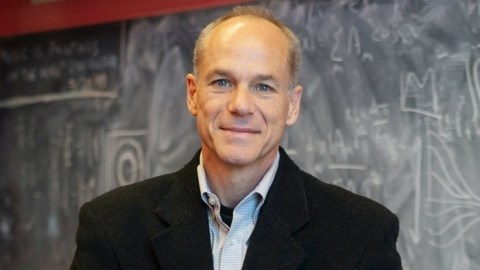Atheism is inconsistent with science, says Dartmouth physicist Marcelo Gleiser

Eli Burakian / Dartmouth College
- Dr. Marcelo Gleiser has become the first Latin American to win the Templeton Prize.
- The prize is given out for “contribution to affirming life’s spiritual dimension.”
- In an interview about the prize, he argued that atheism is “inconsistent with the scientific method.”
Dartmouth College physics professor Marcelo Gleiser has become the first Latin American to win the Templeton Prize in recognition of his “exceptional contribution to affirming life’s spiritual dimension, whether through insight, discovery, or practical works.”
Prior to winning the 2019 award on March 19, Dr. Gleiser had exhibited his spiritual side to the press, even arguing why he believes atheism is unscientific.
In an interview that will shock many atheists, Dr. Gleiser told Scientific American why he finds atheism to be a bridge too far for a scientific mind:
“I think atheism is inconsistent with the scientific method. What I mean by that is, what is atheism? It’s a statement, a categorical statement that expresses belief in nonbelief. ‘I don’t believe even though I have no evidence for or against, simply I don’t believe.’ Period. It’s a declaration. But in science we don’t really do declarations. We say, ‘Okay, you can have a hypothesis, you have to have some evidence against or for that.’ And so an agnostic would say, look, I have no evidence for God or any kind of god (What god, first of all? The Maori gods, or the Jewish or Christian or Muslim God? Which god is that?) But on the other hand, an agnostic would acknowledge no right to make a final statement about something he or she doesn’t know about.”
He further explains his stance on not trying to claim that we know everything in a well-reasoned defense of humility in science:
“I believe we should take a much humbler approach to knowledge, in the sense that if you look carefully at the way science works, you’ll see that yes, it is wonderful — magnificent! — but it has limits. And we have to understand and respect those limits. And by doing that, by understanding how science advances, science really becomes a deeply spiritual conversation with the mysterious, about all the things we don’t know.”
Why spiritualizing the cosmos is a disservice to science and religioncontent.jwplatform.com
In some ways, it is.
Dr. Gleiser reminds us that we are on an “island of knowledge” in the middle of an “ocean of the unknown.” As knowledge advances, we become more aware of what we don’t know. As he puts it:
The paradox of knowledge is that as it expands and the boundary between the known and the unknown changes, you inevitably start to ask questions that you couldn’t even ask before.
His notion that we should not be too proud of what we know and open to the idea that we might discover something tomorrow that changes everything isn’t without precedent. Lord Kelvin, a brilliant British scientist of the 19th century, claimed that flight was impossible and that X-rays were a hoax. Albert Abraham Michelson, an American physicist also working just before the relativistic and quantum revolutions in physics, suggested that the laws of physics had all been worked out and that the only task left was to improve accuracy in measurement.
If we listened to these two who thought we’d already figured everything out, we’d be stuck in the 1890s. It may well turn out that the claim “there is no God” could end up being similar to saying, “No balloon and no aeroplane will ever be practically successful” in 1902. Similarly, skepticism of the claim “X doesn’t exist” is also important in science since “X” might show up someday.
Neil deGrasse Tyson: Atheist or Agnostic?content.jwplatform.com
While it remains true that humility can be a good thing, that we don’t know what we don’t know, and that it is impossible to prove the negative statement that “God doesn’t exist,” Bertrand Russell reminds us that we can still be rational while saying we don’t believe in something we cannot disprove the existence of.
Famous for his well-reasoned atheism, Russell acknowledged that he was technically an agnostic and declaring there to be no God was a step too far. However, he pointed out why that step shouldn’t bother anybody:
“I ought to call myself an agnostic; but, for all practical purposes, I am an atheist. I do not think the existence of the Christian God any more probable than the existence of the gods of Olympus or Valhalla. To take another illustration: nobody can prove that there is not between the Earth and Mars a china teapot revolving in an elliptical orbit, but nobody thinks this sufficiently likely to be taken into account in practice. I think the Christian God just as unlikely.”
That quote refers to his famous teapot analogy, excerpted below:
“If I were to suggest that between the Earth and Mars there is a china teapot revolving about the sun in an elliptical orbit, nobody would be able to disprove my assertion provided I were careful to add that the teapot is too small to be revealed even by our most powerful telescopes. But if I were to go on to say that, since my assertion cannot be disproved, it is intolerable presumption on the part of human reason to doubt it, I should rightly be thought to be talking nonsense.”
What Russell is saying is that just because a point that is asserted without evidence cannot be disproved doesn’t mean it is unreasonable to think it isn’t true. Furthermore, Russell places the burden of proof on the person making the positive claim — God/the teapot exists — and not on the person questioning that claim.
Astronomer and science educator Carl Sagan made a similar point about the dragon in his garage:
“Suppose I seriously make such an assertion to you. Surely you’d want to check it out, see for yourself. There have been innumerable stories of dragons over the centuries, but no real evidence. What an opportunity!
‘Show me,’ you say. I lead you to my garage. You look inside and see a ladder, empty paint cans, an old tricycle–but no dragon.
‘Where’s the dragon?’ you ask.
‘Oh, she’s right here,’ I reply, waving vaguely. ‘I neglected to mention that she’s an invisible dragon.’
You propose spreading flour on the floor of the garage to capture the dragon’s footprints.
‘Good idea,’ I say, ‘but this dragon floats in the air.’
Then you’ll use an infrared sensor to detect the invisible fire.
‘Good idea, but the invisible fire is also heatless.’
You’ll spray-paint the dragon and make her visible.
‘Good idea, but she’s an incorporeal dragon and the paint won’t stick.’
And so on. I counter every physical test you propose with a special explanation of why it won’t work.
Now, what’s the difference between an invisible, incorporeal, floating dragon who spits heatless fire and no dragon at all? If there’s no way to disprove my contention, no conceivable experiment that would count against it, what does it mean to say that my dragon exists? Your inability to invalidate my hypothesis is not at all the same thing as proving it true. Claims that cannot be tested, assertions immune to disproof are veridically worthless, whatever value they may have in inspiring us or in exciting our sense of wonder. What I’m asking you to do comes down to believing, in the absence of evidence, on my say-so.”
Sagan, like Russell, is arguing that the burden of proof is on the person making the claim. Since there is no evidence of the dragon, it is hardly anti-scientific to say you don’t believe the dragon is there.
Is it going too far to claim that God doesn’t exist? That depends on where you want to place the burden of proof and how much evidence (or the lack thereof) is needed to make a claim. In any case, Dr. Gleiser makes a good point about not claiming to know more than you do and the need for a bit of humility.
I for one still won’t believe you if you tell me you’re off for a cup of tea on Mars with the dragon that lives in your garage.





